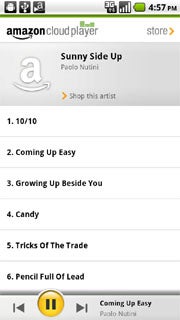In the virtual game of mobile moneymaking, Amazon has just made a brilliant move.
 Amazon, as you may have heard, announced a new service called Cloud Drive on Tuesday. The service gives you a free 5GB of online storage for your music, then lets you stream your songs on-demand from the Web or any Android device. You can get additional storage for a dollar per year per gig.
Amazon, as you may have heard, announced a new service called Cloud Drive on Tuesday. The service gives you a free 5GB of online storage for your music, then lets you stream your songs on-demand from the Web or any Android device. You can get additional storage for a dollar per year per gig.
The service couldn't be simpler: You use Amazon's PC-based tool to find all the music on your computer and dump it onto Amazon's servers. You install Amazon's Cloud Player app onto your Android phone and, if you have one, your Android tablet, too. Then, wherever you are -- whatever device you're using -- you can pull up your tunes and play 'em as if they were right there with you.
The concept itself, of course, is nothing new: Smaller companies such as mSpot and Rdio have offered similar services for some time. Even so, make no mistake about it: Amazon's entry into the realm of online music streaming has the potential to seriously shake up the Android landscape.
Amazon Cloud Drive and the Android Ecosystem
When you look at the scenario surrounding Amazon Cloud Drive and Cloud Player, one thing becomes increasingly clear: Amazon is working to position itself as the de facto content provider for the Android platform. And Cloud Drive and Cloud Player are crucial new steps in that process.
Actually letting you store your music on its Cloud Drive servers isn't where Amazon stands to make its most significant gains, though. Cloud Drive is merely a mechanism to draw you in. Making Amazon a focal part of your mobile experience is where the company's real value lies.
 Just look at Amazon's Cloud Player app for Android: If you use Cloud Drive, you'll inevitably use Cloud Player. You might even use it as your primary music playing application, online and off, since the program works with both cloud-stored music and locally stored songs. And what's prominently placed on every single screen within the Cloud Player app? A link to buy more songs from Amazon's MP3 store. The "Store" link itself is visible at the top of the screen throughout the entire Cloud Player application. When you're listening to a song, a second link appears offering to show you more selections from that same artist.
Just look at Amazon's Cloud Player app for Android: If you use Cloud Drive, you'll inevitably use Cloud Player. You might even use it as your primary music playing application, online and off, since the program works with both cloud-stored music and locally stored songs. And what's prominently placed on every single screen within the Cloud Player app? A link to buy more songs from Amazon's MP3 store. The "Store" link itself is visible at the top of the screen throughout the entire Cloud Player application. When you're listening to a song, a second link appears offering to show you more selections from that same artist.
The Amazon shopping integration is seamless, too: Tapping any of the store-aimed links opens a page right within the same app, without so much as stopping the song you're playing. Since you're using Cloud Player, you're already signed into your Amazon account -- and that means you can make a purchase without ever having to enter a credit card number.
And remember: This is all on Android. Amazon isn't launching Cloud Player on iOS. There is no Windows Phone version. The focus is squarely on Android -- and with good reason.
One of Android's strengths as a platform is the fact that it doesn't force you to use any particular program for managing your music. There is no iTunes; instead, you can pick from any number of third-party options, or you can forgo the graphical interface altogether and just drag and drop files at will. The freedom provided by this approach is empowering, but it also means there's no universal one-stop place to shop for multimedia content and have it beamed directly onto your device. There is no de facto store.
Amazon may have just changed that.
Amazon Cloud Drive: The Bigger Picture
Now, Amazon's Cloud Drive is only part of the picture. First of all, keep in mind that Amazon's Android app -- officially called Amazon MP3 -- comes preinstalled on plenty of Android phones. That means those devices are now fully equipped with the new Cloud Drive and Cloud Player services right out of the gate. All the user has to do is sign in once.
Next, factor in Amazon's app store for Android. Launched last week, the store strives to serve as an alternative to the main Google Android Market, using exclusive offerings, daily freebies, and friction-free Amazon checkout to attract customers. While the reach of Amazon's Android app store is still relatively small, it likely won't take long to evolve. Already, we're seeing the launch of the first U.S. smartphone with Amazon's app store preinstalled: the upcoming HTC Merge by Cellular South. Odds are, that's just the start; it only makes sense that Amazon is working hard and fast to score broader distribution deals for the future.
If all of that isn't enough, ongoing buzz suggests Amazon may eventually come out with its own custom-branded Android tablet. But I suspect that's the smaller story compared to these software-oriented offerings and their potentially enormous reach.
 Google itself has reportedly been working on a cloud-based music service for ages -- in fact, the "almost ready" rumor surfaced yet again just this afternoon (no coincidence, I'm sure). But in this game, timing is everything. If you upload 50 gigs of music -- or, heck, even 5 gigs of music -- to a remote server, you're probably not going to bother uploading it to some other server six months later. The longer Google waits, the larger advantage Amazon gains. Unless Google comes up with some major incentive to pull people in, users snatched up by Amazon may end up being users lost.
Google itself has reportedly been working on a cloud-based music service for ages -- in fact, the "almost ready" rumor surfaced yet again just this afternoon (no coincidence, I'm sure). But in this game, timing is everything. If you upload 50 gigs of music -- or, heck, even 5 gigs of music -- to a remote server, you're probably not going to bother uploading it to some other server six months later. The longer Google waits, the larger advantage Amazon gains. Unless Google comes up with some major incentive to pull people in, users snatched up by Amazon may end up being users lost.
One last point to consider: What's still missing in the Android ecosystem? A simple one-stop place to shop for video content and have it beamed directly onto your device. And what company has the means to provide such a service, complete with its own ready-to-go payment system? You guessed it: Amazon. If Amazon really wants to rule the realm of Android multimedia shopping, we all know what it'll do next.
Finally, here's the best part of all this for us as consumers: You can bet that Amazon's competitors aren't going to let anyone take the throne as Android's content leader without one hell of a fight. And that means we're bound to see tons of cool new multimedia services, features, and pricing models over the next several months -- from third-party companies, for sure, and probably from Google as well. Competition forces everyone to step up their game and fight for our loyalty, and as users, that's exactly what we want to see.
Things are about to get very interesting.
JR Raphael is a PCWorld contributing editor and the author of the Android Power blog. You can find him on both Facebook and Twitter.

Source: http://feeds.pcworld.com/click.phdo?i=3e26f54a376700952b04584f9b204cb2
Rockwell Automation Rogers Communications Saic Salesforce Com Samsung
No comments:
Post a Comment